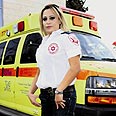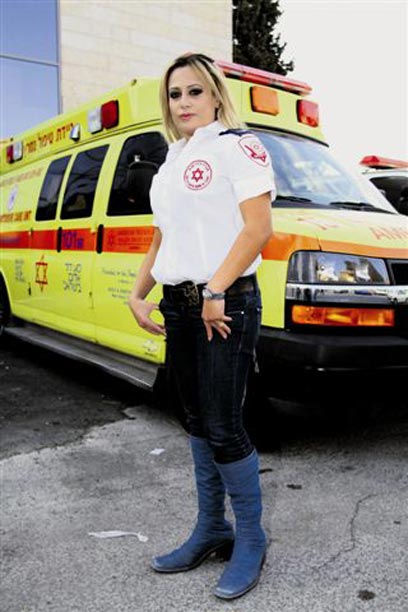
For a moment she even feared she won't be able to find a match. But all this did not stop her from fulfilling her life's dream.
Now, after being admitted by MDA and making history as the organization's first Arab volunteer, she says with complete confidence: "I engage in saving lives and don’t get into questions of religion or nationality. I'm actually receiving a lot of support within my sector."
'They treat me well'
Kihia entered an MDA station in east Jerusalem recently and was taken in as an ambulance driver. "I came to MDA after hearing for years about its life-saving operations," she says proudly. "At first I took basic first aid courses and slowly made progress."
There were quite a few difficulties on the way. "Friends and family asked me why would I want to volunteer with MDA and not with the Red Cross, for example. But my parents helped me move on and make progress in the professional courses offered by the organization."

Kihia. Overcoming criticism (Photo: Shlomi Cohen)
If you ask Kihia, this isn't her last stop in the rescue organization – one day she would like to become a paramedic. In the meantime, she receives all the possible support from her family members, and particularly from her new husband whom she married several months ago.
"One of the problems was the fact that I get home late, which is unacceptable in my sector," she shares, "but my family supported me and so did my husband. He said, 'Do what you want. You have my support.'
"The truth is that I didn't even think about what people would say. Even before I met him I said I wouldn't want to marry a man who would be annoyed by the fact that I return home late or drive an ambulance."
The other MDA volunteers, she says, appeared unmoved by the fact that she's a Muslim. "They treat me well and like me here, despite the language difficulties," she says.
In the meantime, she is getting puzzled looks on the street when people recognize her as part of the emergency crew.
"The Arabs are very surprised to see me driving an ambulance. They can't believe that I have a driver's license and that I'm a medical assistant," she says. "After they understand, they actually compliment me."
Kihia receives a lot of encouragement from the other side as well. "On Yom Kippur I was stationed outside a very big synagogue in Jerusalem, with thousands of worshippers. All the women there were very excited to see me, especially in light of the fact that I'm Arab," she recalls. "They treated me well and showed me a lot of respect."
She admits, however, that not all encounters with Jewish patients are as pleasant. In some cases, she says, she is asked to turn off or turn off the electricity in Jewish homes on Shabbat and holidays.
Are you prepared for terror attacks and the possibility of people cursing you?
"I'm mentally prepared, and naturally I separate between my work and my emotions."
How do the people of your sector react when you wear the uniform with the MDA symbol, especially on such tense days?
"As far as I'm concerned, I'm saving lives and I don't get into those questions. I have never encountered such problems."
Another obstacle Kihia is forced to deal with is the need to work alongside men around the clock.
"At first it was difficult working with a team comprised mostly by men, but I've gotten used to that already. They're nice. At the station I am friends with the Jewish girls. I teach them Arabic and learn Hebrew from them. In the meantime I use the advantage of my language in east Jerusalem."
Murad Salman, director of the east Jerusalem team, concludes: "We hope that Kihia's decision to join us will raise awareness for volunteer work among other young people from the Arab sector."















